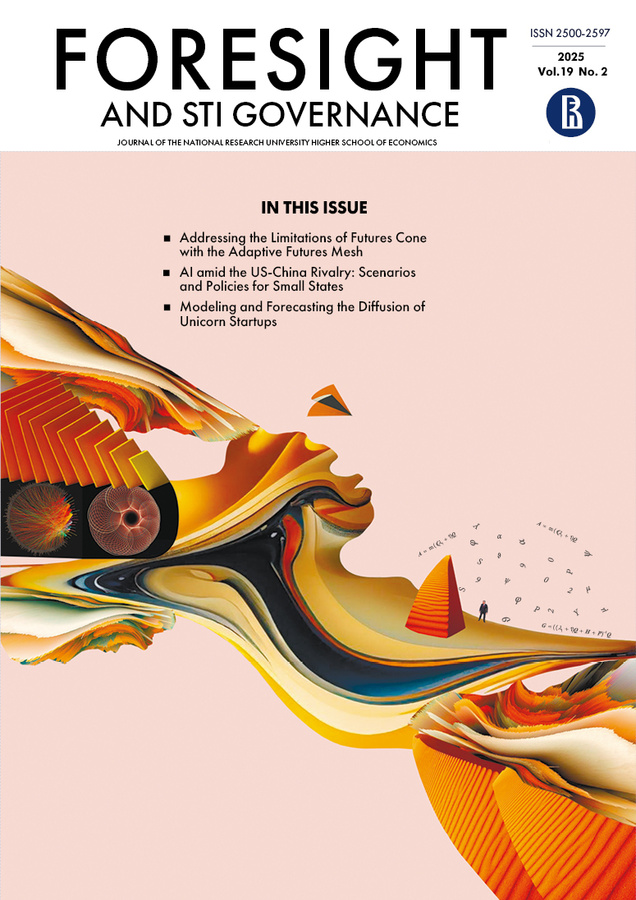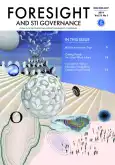Smart Specialization as a Tool to Foster Innovation in Emerging Economies: Lessons from Brazil
- Authors: Bosch A.1, Vonortas N.2,1,3
-
Affiliations:
- George Washington University
- HSE University
- Universidade Estadual de Campinas (UNICAMP)
- Issue: Vol 13, No 1 (2019)
- Pages: 35-47
- Section: INNOVATION
- URL: https://journal-vniispk.ru/1995-459X/article/view/347025
- DOI: https://doi.org/10.17323/2500-2597.2019.1.32.47
- ID: 347025
Cite item
Abstract
About the authors
Anna Bosch
George Washington University
Email: annabosch@gwu.edu
1957 E Street, N.W., Suite 403, Washington, D.C., 20054 USA
Nicholas Vonortas
HSE University; George Washington University; Universidade Estadual de Campinas (UNICAMP)
Email: nvonortas@hse.ru
1957 E Street, N.W., Suite 403, Washington, D.C. 20052, USA.; Cidade Universitaria Zeferino Vaz - Barao Geraldo, Campinas - SP, 13083-970, Brazil
References
- Alderete M.V., Bacic M. J. (2018) Local Productive Arrangements and Local Development in Non-Metropolitan Municipalities of Sao Paulo, Brazil // Cuadernos De Gestión. Vol. 18. № 1. P. 103-123.
- Asheim B., Grillitsch M., Trippl M. (2017) Smart Specialization as an Innovation-Driven Strategy for Economic Diversification: Examples From Scandinavian Regions // Advances in the Theory and Practice of Smart Specialization / Eds. S. Radošević, A. Curaj, R. Gheorghiu, I. Wade. Amsterdam: Academic Press. P. 73-97. Режим доступа: , дата обращения 21.02.2019. DOI:https://doi.org/10.1016/B978-0-12-804137-6.00004-8
- Asheim B.T. (2018) Smart specialisation, innovation policy and regional innovation systems: What about new path development in less innovative regions? // Innovation: The European Journal of Social Science Research. Vol. 32. № 1. P. 8-25. Режим доступа: , дата обращения 27.02.2019. DOI:https://doi.org/10.1080/13511610.2018.1491001
- Bachtler J., Berkowitz P., S. Hardy (eds.) (2017) EU cohesion policy: Reassessing performance and direction. London, New York: Routledge, Taylor & Francis Group.
- Baer W. (ed.) (2012) The regional impact of national policies: The case of Brazil. Cheltenham: Edward Elgar.
- Balland P.-A., Boschma R., Crespo J., Rigby D.L. (2018) Smart specialization policy in the European Union: Relatedness, knowledge complexity and regional diversification // Regional Studies. Vol. 35. № 4. P. 1-17. Режим доступа: , дата обращения 21.02.2019. DOI:https://doi.org/10.1080/00343404.2018.1437900
- Barroeta B., Gómez Prieto J., Paton J., Palazuelos M. (2017) Innovation and Regional Specialisation in Latin America: Identifying conceptual relations with the EU Smart Specialisation approach. Luxembourg: JRC EC. Режим доступа:https://ec.europa.eu/jrc/sites/jrcsh/files/innovation_and_regional_specialisation_latinoamerica.pdf, дата обращения 17.02.2019.
- Boschma R. (2013) Constructing Regional Advantage and Smart Specialization: Comparison of Two European Policy Concepts. Evolutionary Economic Geography Series Paper № 13.22. Utrecht: University of Utrecht.
- Boschma R. (2016) Smart Specialisation and Regional Innovation Policy // Welsh Economic Review. Vol. 24. Р. 17. Режим доступа: , дата обращения 15.01.2019. DOI:https://doi.org/10.18573/j.2016.10050
- Cavalcante L.R., Uderman S. (2012). Science, technology and innovation policies in the regional development of Brazil // The regional impact of national policies: The case of Brazil / Ed. W. Baer. Cheltenham: Edward Elgar. P. 98-121.
- Crespo J., Balland P.-A., Boschma R., Rigby D. (2017) Regional Diversification Opportunities and Smart Specialization Strategies. Brussels: European Commission.
- DWIH São Paulo (2018) Brazil - Research Funding. Режим доступа:https://dwih.com.br/en/brazil-research-funding, дата обращения 25.01.2019.
- EU Brazil Sector Dialogues (2018) Brazil unveils Smart Specialisations platform in a workshop during European Week of Regions and Cities. Режим доступа:http://www.sectordialogues.org/new/brazil-unveils-smart-specialisations-platform-in-a-workshop-during-european-week-of-regions-and-cities, дата обращения 02.12.2018.
- EUA (2018) Coherent Policies for Europe Beyond 2020: Maximising the Effectiveness of Smart Specialisation Strategies for Regional Development. Brussels: European University Association. Режим доступа:https://eua.eu/component/attachments/attachments.html?id=376, дата обращения 16.01.2019.
- Esteves K., Feldmann P.R. (2016) Why Brazil does not innovate: A comparison among nations // RAI Revista De Administração E Inovação. Vol. 13. № 1. P. 29-38. Режим доступа: , дата обращения 16.12.2018. DOI:https://doi.org/10.1016/j.rai.2016.04.002
- European Commission (2017) Reflection Paper on Harnessing Globalisation. Brussels: European Commission. Режим доступа:https://ec.europa.eu/commission/sites/beta-political/files/reflection-paper-globalisation_en.pdf, дата обращения 19.01.2019.
- European Commission (2018a) Smart Specialisation and Technology Transfer as Innovation Drivers for Regional Growth. Summary Report on the conference held in Sofia, May 3-4, 2018. Sofia: European Commission. Режим доступа:https://ec.europa.eu/jrc/sites/jrcsh/files/summary-report_conf_innovation-drivers-regional-growth.pdf, дата обращения 25.01.2019.
- European Commission (2018b) Pilot Action - Regions in Industrial Transition. Project Leaflet by Directorate-General for Regional and Urban Policy. Brussels: European Commission. Режим доступа:https://ec.europa.eu/regional_policy/sources/docgener/informat/industrial_transition/pilot_industrial_transition.pdf, дата обращения 15.01.2019.
- European Commission (2018c) Smart Specialisation - Pilot Actions. Project Leaflet by Directorate-General for Regional and Urban Policy. Brussels: European Commission. Режим доступа:http://europa.eu/rapid/attachment/IP-17-1995/en/SmartSpecialisation_PilotActions.pdf, дата обращения 15.01.2019.
- European Commission (n. d.) Smart Specialisation - Strenghtening Innovation in Europe's Regions. Project Leaflet by Directorate-General for Regional and Urban Policy. Brussels: European Commission. Режим доступа:http://ec.europa.eu/regional_policy/sources/docgener/guides/smart_spec/strength_innov_regions_en.pdf, дата обращения 15.01.2019.
- FAPESP (2018) About the São Paulo Research Foundation. Режим доступа:http://www.fapesp.br/en/about, дата обращения 22.12.2018.
- Faleiro F., Ovanessoff A., Plastino E. (2016) Why Brazil Must Learn to Trust in Collaborative Innovation. Sao Paolo: Accenture. Режим доступа:https://www.accenture.com/t20170411T180335Z__w__/us-en/_acnmedia/PDF-32/Accenture-Why-Brazil-Must-Learn-To-Trust-In-Collaborative-Innovation-Executive-Summary.pdfla=en, дата обращения 13.01.2019.
- Foray D. (2015) Smart Specialisation - Opportunities and Challenges for Regional Innovation Policy (1st ed.). London: Routledge.
- Foray D. (2016) On the policy space of smart specialization strategies // European Planning Studies. Vol. 24. № 8. P. 1428-1437. Режим доступа: , дата обращения 06.02.2019. DOI:https://doi.org/10.1080/09654313.2016.1176126
- Foray D. (2017) The Economic Fundamentals of Smart Specialization Strategies // Advances in the Theory and Practice of Smart Specialization / Eds. S. Radošević, A. Curaj, R. Gheorghiu, I. Wade. Amsterdam: Academic Press. P. 37-50. Режим доступа: , дата обращения 12.02.2019. DOI:https://doi.org/10.1016/B978-0-12-804137-6.00002-4
- Foray D., David P.A., Hall B.H. (2011) Smart specialization: From academic idea to political instrument, the surprising career of a concept and the difficulties involved in its implementation (MTEI Working Paper). Lausanne: Ecole Polytechnique Federale de Lausanne.
- Foray D., Goenaga X. (2013) The Goals of Smart Specialisation. JRC Scientific and Policy Reports - S3 Brief Series № 1. Brussels: European Commission.
- Foray D., Morgan K., Radosevic S. (2018) The Role of Smart Specialisation in the EU Research and Innovation Policy Landscape. Brussels: European Commission. Режим доступа:http://ec.europa.eu/regional_policy/sources/docgener/brochure/smart/role_smartspecialisation_ri.pdf, дата обращения 13.01.2019.
- Gheorghiu R., Andreescu L., Zulean M., Curaj A. (2017) Entrepreneurial Discovery as a Foresight for Smart Specialization: Trade-Offs of Inclusive and Evidence-Based Consensus // Advances in the Theory and Practice of Smart Specialization / Eds. S. Radošević, A. Curaj, R. Gheorghiu, I. Wade. Amsterdam: Academic Press. P. 319-344. Режим доступа: , дата обращения 09.12.2018. DOI:https://doi.org/10.1016/B978-0-12-804137-6.00014-0
- Haberleithner J., Demblans A., Gómez J., Palazuelos M. (2018) Smart Specialization Worldwide: Federative Republic of Brazil. Brussels: European Commission.
- IBICT (2013) Brasilia 2060 - Structure Plan. Brasilia: Ministério da Ciência, Tecnologia e Inovação (MCTI). Режим доступа:https://issuu.com/assinter/docs/brasilia_2060, дата обращения 12.12.2018.
- IBICT (2018) Descoberta Empreendedora: Especialização Inteligente para a Economia Criativa em Brasília [Entrepreneurial Discovery: Smart Specialization for the Creative Economy in Brasilia]. Socialismo Criativo. 18.06.2018. Режим доступа:http://socialismocriativo.com.br/descoberta-empreendedora-especializacao-inteligente-para-a-economia-criativa-em-brasilia/, дата обращения 02.03.2019.
- Ingold R., Ovanessoff A., Plastino E. (2015) Outlook: Unleashing Brazil's Innovation Potential. Sao Paolo: Accenture. Режим доступа:https://www.accenture.com/t20150521T071944Z__w__/us-en/_acnmedia/Accenture/Conversion-Assets/Outlook/Documents/2/Accenture-Outlook-Unleashing-Brazil-Innovation-Potential.pdf#zoom=50, дата обращения 01.03.2019.
- JRC EC (n.d.) Smart Specialisation for lagging regions. Brussels: Joint Research Centre of the European Commission. Режим доступа:https://ec.europa.eu/jrc/sites/jrcsh/files/Smart%20Specialisation%20for%20lagging%20regions.pdf, дата обращения 22.12.2018.
- Ketels C., Nauwelaers C., Cassingena-Harper J., Lindqvist G., Lubicka B., Peck F. (2013) The Role of Clusters in Smart Specialisation Strategies. Brussels: European Commission. Режим доступа:https://ec.europa.eu/research/evaluations/pdf/archive/other_reports_studies_and_documents/clusters_smart_spec2013.pdf, дата обращения 11.01.2019.
- Kotnik P., Petrin T. (2017) Implementing a smart specialisation strategy: An evidence-based approach // International Review of Administrative Sciences. Vol. 83. № 1. P. 85-105. Режим доступа: , дата обращения 15.01.2019. DOI:https://doi.org/10.1177/0020852315574994
- Kroll H. (2014) Efforts to Implement Smart Specialization in Practice - Leading Unlike Horses to the Water // European Planning Studies. Vol. 23. № 10. P. 2079-2098. Режим доступа: , дата обращения 22.12.2018. DOI:https://doi.org/10.1080/09654313.2014.1003036
- Kuznetsov Y., Sabel C. (2017) Managing Self-Discovery: Diagnostic Monitoring of a Portfolio of Projects and Programs // Advances in the Theory and Practice of Smart Specialization / Eds. S. Radošević, A. Curaj, R. Gheorghiu, I. Wade. Amsterdam: Academic Press. P. 51-72. Режим доступа: , дата обращения 21.12.2018. DOI:https://doi.org/10.1016/B978-0-12-804137-6.00003-6
- Landabaso M., Foray D. (2014) From smart specialisation to smart specialisation policy // European Journal of Innovation Management. Vol. 17. № 4. P. 492-507. Режим доступа: , дата обращения 02.03.2019. DOI:https://doi.org/10.1108/EJIM-09-2014-0096
- Landabaso M., McCann P., Ortega-Argilés R. (2014) Smart specialisation in European regions: Issues of strategy, institutions and implementation // European Journal of Innovation Management. Vol. 17. № 4. P. 409-427. Режим доступа: , дата обращения 02.03.2019. DOI:https://doi.org/10.1108/EJIM-05-2014-0052
- MCTIC (2016) Estratégia Nacional De Ciência, Tecnologia E Inovação 2016-2012 [National Strategy for Science, Technology and Innovation]. Brasília: Ministério da Ciência, Tecnologia, Inovações e Comunicações (MCTIC).
- MCTIC (2018) Recursos Aplicados - Indicadores Consolidados [Applied Resources - Consolidated Indicators], Brasília: Ministério da Ciência, Tecnologia, Inovações e Comunicações (MCTIC). Режим доступа:https://www.mctic.gov.br/mctic/opencms/indicadores/detalhe/recursos_aplicados/indicadores_consolidados/2_1_3.html, дата обращения 02.03.2019.
- MDIC (2018) Arnajos Produtivos Locais - APL. Brasília: Ministério da Indústria, Comércio Exterior e Serviços (MDIC). Режим доступа:http://www.mdic.gov.br/index.php/competitividade-industrial/arranjos-produtivos-locais, дата обращения 02.03.2019.
- Maragna L. (2016) RIO Country Report 2015: Brazil. Brussels: European Commission.
- Marques P., Morgan K. (2018) The Heroic Assumptions of Smart Specialisation: A Sympathetic Critique of Regional Innovation Policy // New avenues for regional innovation systems: Theoretical advances, empirical cases and policy lessons / Eds. A. Isaksen, R. Martin, M. Trippl. Cham, Switzerland: Springer.
- Mazzucato M., Caetano P. (2016) The Brazilian Innovation System: A Mission-Oriented Policy Proposal. Brasília: CGEE.
- McCann P., Ortega-Argilés R. (2013) Smart Specialization, Regional Growth and Applications to European Union Cohesion Policy // Regional Studies. Vol. 49. № 8. P. 1291-1302. Режим доступа: , дата обращения 22.12.2018. DOI:https://doi.org/10.1080/00343404.2013.799769
- McCann P., Ortega-Argilés R. (2016a) The early experience of smart specialization implementation in EU cohesion policy // European Planning Studies. Vol. 24. № 8. P. 1407-1427. Режим доступа: , дата обращения 22.12.2018. DOI:https://doi.org/10.1080/09654313.2016.1166177
- McCann P., Ortega-Argilés R. (2016b) Smart Specialisation: Insights from the EU Experience and Implications for Other Economies // Investigaciones Regionales - Journal of Regional Research. Vol. 36. P. 279-293.
- Negri F. (2018) Novos caminhos para a inovação no Brasil [New paths for innovation in Brazil]. Washington, D.C.: Wilson Center.
- OECD (2012) Economic Policy Reforms 2012: Going for Growth. Paris: OECD.
- OECD (2013) Innovation-driven Growth in Regions: The Role of Smart Specialisation. Paris: OECD.
- OECD (2014) OECD Science, Technology and Industry Outlook 2014. Paris: OECD.
- Oliveira F., Ovanessoff A., Peppes A., Plastino E. (2014) Yesterday's Truths, Today's Realities: A New Global Mindset for Brazilian Business. Sao Paolo: Accenture. Режим доступа:https://www.accenture.com/t20170411T175630Z__w__/us-en/_acnmedia/Accenture/Conversion-Assets/DotCom/Documents/Global/PDF/Digital_3/Accenture-Brazil-Yesterdays-Truths-Todays-realities-Zoom-Fixed.pdf#zoom=50, дата обращения 22.12.2018.
- Ovanessoff A., Peppes A. (2015) What Business Must Do to Reignite Brazil’s Productivity. Sao Paolo: Accenture. Режим доступа:https://www.accenture.com/t20170411T175826Z__w__/us-en/_acnmedia/PDF-32/Accenture-What-Business-Must-Do-To-Reignite-Brazil-Productivity-Growth.pdf#zoom=50, дата обращения 22.12.2018.
- Pinto H. (2018) RIS3-PE: Final Report: For a vision of the Smart Specialisation Strategy in selected innovative territories of the State of Pernambuco. Brussels: European Commission. Режим доступа:https://ec.europa.eu/regional_policy/sources/cooperate/international/pdf/RIS3-PE_Final_report_en.pdf, дата обращения 24.12.2018.
- Radosevic S. (2017) Advancing Theory and Practice of Smart Specialization: Key Messages. Advances in the Theory and Practice of Smart Specialization / Eds. S. Radošević, A. Curaj, R. Gheorghiu, I. Wade. Amsterdam: Academic Press. P. 345-355. Режим доступа: , дата обращения 22.12.2018. DOI:https://doi.org/10.1016/B978-0-12-804137-6.00015-2
- Veldhuizen C., Wilson B., Coenen L., Goedegebuure L., Schoen M. (2018) State of the Art Review of Smart Specialisation in Europe. Melbourne: University of Melbourne. Режим доступа:https://sustainable.unimelb.edu.au/__data/assets/pdf_file/0006/2792319/State-of-the-Art-Review-of-Smart-Specialisation-in-Europe.pdf, дата обращения 21.12.2018.
- World Bank Group (2018) Doing Business 2018 - Reforming to Create Jobs. Washington, D.C.: World Bank Group. Режим доступа:http://www.doingbusiness.org/content/dam/doingBusiness/media/Annual-Reports/English/DB2018-Full-Report.pdf, дата обращения 02.03.2019.
Supplementary files









